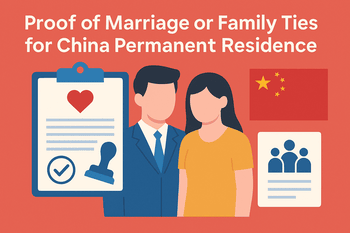
In this blog post, we’ll provide a beginner’s guide to understanding China’s tax system for foreigners.
China’s tax system can be complex and confusing, especially for foreigners who are not familiar with the country’s tax laws.
Tax Residency Status for Foreigners
Determining tax residency is a crucial aspect of understanding tax obligations for foreigners in China.
The criteria for tax residency status are determined by the Chinese tax authorities and depend on factors such as:
- The length of stay
- The purpose of stay
- The existence of a permanent establishment
In general, an individual is considered a tax resident if they have resided in China for 183 days or more in a calendar year.
However, there are exceptions and additional considerations for certain circumstances, such as:
- Individuals with Chinese nationality.
- Those who establish a domicile in China.
- Individuals who are deemed to have “economic ties” to China.
It is important for foreigners to accurately determine their tax residency status, as it determines their liability for taxes on worldwide income or only income generated within China.
To establish tax residency, individuals may need to provide supporting documents, such as residence permits, work permits, or proof of physical presence in China.
Foreigners should consult with tax professionals or seek guidance from the Chinese tax authorities to ensure proper determination of their tax residency status.
Types of Taxes Applicable to Foreigners
There are several types of taxes that may be applicable to foreigners in China. The most common types of taxes are:
Individual Income Tax (IIT)
IT is levied on the income of individuals who are considered tax residents of China.
As of 2023, China utilizes a progressive tax system with several income brackets and corresponding tax rates.
The tax rates range from 3% to 45%, with the higher rates applying to higher income levels. The income brackets are periodically adjusted by the Chinese government to reflect economic changes and inflation.
Foreigners who are not tax residents of China are only required to pay IIT on income generated within China.
Value Added Tax (VAT
VAT is a consumption tax that is levied on the value added to goods and services at each stage of production or distribution.
The standard VAT rate in China is 13%, although there are reduced rates of 9% and 6% for certain goods and services.
Corporate Income Tax (CIT)
CIT is levied on the income of companies that are registered in China.
The standard CIT rate in China is 25%, although there are reduced rates of 15% and 20% for certain types of companies.
Filing Taxes in China
Foreigners who are required to pay taxes in China must file an annual tax return by June 30th of the following year.
The tax return can be done via the Tax App named 个人所得税 that you can download from here.
The tax return must include all income earned in China during the previous calendar year.
Foreigners who are not tax residents of China are only required to file a tax return if they have generated income within China.
Conclusion
Understanding China’s tax system can be challenging, but it is essential for foreigners who are living and working in China.
By understanding the criteria for tax residency status, the types of taxes that may be applicable, and the requirements for filing taxes in China, foreigners can ensure that they are in compliance with Chinese tax laws.
If you have any questions or concerns about your tax obligations in China, it is recommended that you seek guidance from a qualified tax professional or the Chinese tax authority.



